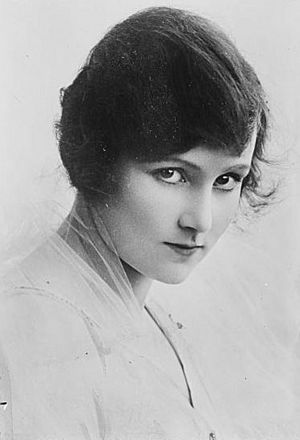Mary Rose (play) facts for kids
Mary Rose is a mysterious play written by J. M. Barrie. He is famous for creating Peter Pan. The play first opened in London in April 1920. It had special music made just for it by Norman O'Neill. Later that year, it also opened in New York. The play has been brought back to the stage many times since then.
Contents
What is Mary Rose About?
This play tells the fictional story of a girl named Mary Rose. She mysteriously disappears not once, but twice!
Mary Rose's First Disappearance
When Mary Rose was a child, her father took her to a faraway island in Scotland. For a short moment, her father looked away. When he looked back, Mary Rose was gone. People searched the whole island, but she was nowhere to be found. Then, 21 days later, Mary Rose suddenly reappeared. It was just as mysterious as her disappearance. She looked exactly the same. She did not seem to know she had been gone for three weeks. She had no memory of that time at all.
Mary Rose's Second Disappearance
Years later, Mary Rose was grown up. She was a wife and a mother. She convinced her husband to take her back to that same island. Once again, she vanished. This time, she was gone for many decades. When she was found again, she had not aged a single day. She still did not know that so much time had passed. While she was gone, her own son had grown up. He was now physically older than his mother.
How the Play Was Staged
J. M. Barrie usually wrote with his right hand. But he wrote Mary Rose with his left hand. This was because of a "writer's cramp."
First London Production
Mary Rose first opened in London on April 22, 1920. It played at the Haymarket Theatre. The show ran for many months, until February 26, 1921. Fay Compton played the main role of Mary Rose. Barrie wrote this part especially for her. The play was brought back to the stage in 1926. Many of the same actors were still in the show.
First New York Production
The play also opened in New York City. It started on December 22, 1920, on Broadway at the Empire Theatre. It ran until April 1921. Ben Iden Payne directed the play. Ruth Chatterton played Mary Rose in this production.
Later Revivals
Mary Rose was brought back to Broadway in 1951. It played at the ANTA Playhouse. Helen Hayes produced this version. Bethel Leslie played Mary Rose. In 2007, the play had an off-Broadway revival. It was also performed again in London in 2012. This show took place at Riverside Studios.
The Play's Music
Norman O'Neill wrote the music for the first 1920 production. His music was very popular. After the first night, Barrie told O'Neill, "I think we have made a success." He later wrote a letter saying it was a "lucky day" when O'Neill had the idea for the music.
Barrie even described the music in the play's script. This made the music a key part of the story. Fay Compton, the actress, said the music was "beautiful" and "haunting." She felt it truly inspired the actors. One person even said that without O'Neill's music, a performance of Mary Rose would be like "a dance by a fairy with a wooden leg." This shows how important the music was.
Other Versions of Mary Rose
The story of Mary Rose has been told in other ways too.
Film Idea by Alfred Hitchcock
The famous film director Alfred Hitchcock saw the play when he was young. Later, he wanted to make it into a movie. He asked a writer named Jay Presson Allen to create a movie script. But Hitchcock was working for Universal Pictures at the time. The studio thought the story was "too troubling" and would not be popular. So, they did not let him make the movie.
Radio Play and Novel
In 2016, a radio play version of Mary Rose was broadcast. It was on BBC Radio 3. Abigail le Fleming adapted and directed it. Laura Moody composed and played the music on her cello. In 2017, a novel called Mary Rose was published. It was written by Geoffrey Girard. This book was a modern retelling of the play. It also included Hitchcock's ideas for his movie. One book review called the novel "a ghost story" that many readers would enjoy.
 | DeHart Hubbard |
 | Wilma Rudolph |
 | Jesse Owens |
 | Jackie Joyner-Kersee |
 | Major Taylor |


